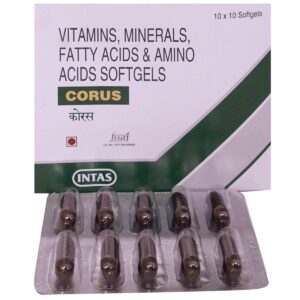MINERALS + VITAMINS
Minerals: Minerals are essential nutrients required by the body for various functions. However, there is a wide range of minerals, each with different uses and mechanisms of action. It is important to specify the specific mineral for a more detailed and accurate description. Here are a few examples:
1. Iron:
– Use: Iron is an essential mineral that plays a crucial role in the production of hemoglobin, which carries oxygen in the blood. It is commonly used to treat iron deficiency anemia.
– Mechanism of action: Iron is involved in the synthesis of hemoglobin, which allows red blood cells to transport oxygen throughout the body.
– Dose: The recommended dose of iron varies depending on the severity of the deficiency and the treatment plan prescribed by a healthcare professional. It is typically taken orally as iron sulfate or ferrous fumarate.
– Side effects: Iron supplements may cause gastrointestinal side effects such as constipation, nausea, stomach pain, and dark-colored stools. In some cases, iron can cause iron overload, especially in individuals with certain genetic conditions. Close medical supervision is necessary.
2. Calcium:
– Use: Calcium is an essential mineral that is vital for maintaining healthy bones and teeth. It is commonly used to prevent and treat calcium deficiency, osteoporosis, and to support healthy bone development in children.
– Mechanism of action: Calcium is necessary for bone mineralization and contributes to the strength and density of bones and teeth. It also plays a role in muscle function, nerve transmission, and hormone regulation.
– Dose: The recommended dose of calcium varies depending on age, gender, and specific health conditions. It is usually taken orally as calcium carbonate or calcium citrate.
– Side effects: Calcium supplements can cause constipation, bloating, and gas. In rare cases, excessive calcium intake can lead to hypercalcemia, which may result in kidney stones or impaired kidney function.
3. Zinc:
– Use: Zinc is an essential mineral involved in various enzymatic reactions, immune function, and DNA synthesis. It is commonly used to support immune function and to treat zinc deficiency.
– Mechanism of action: Zinc is involved in numerous biological processes, including the proper functioning of enzymes that regulate cell growth, immune responses, and wound healing.
– Dose: The recommended dose of zinc varies based on age, sex, and specific health conditions. It is typically taken orally as zinc gluconate or zinc sulfate.
– Side effects: Common side effects of zinc supplements include gastrointestinal issues like nausea, diarrhea, and stomach cramps. Excessive zinc intake can also interfere with copper absorption and cause copper deficiency over time.
Please note that these are just a few examples, and there are numerous other minerals with different uses, mechanisms of action, doses, and side effects. It is crucial to consult a healthcare professional for specific information and guidance regarding the appropriate use of minerals.
Vitamins: Vitamins are organic compounds that are essential for normal growth, development, and overall functioning of the body. These compounds cannot be produced in sufficient quantities by the body, so they need to be acquired through diet or supplements. Vitamins are classified into two categories: fat-soluble (vitamins A, D, E, and K) and water-soluble (vitamins C and B-complex).
Use: Vitamins are used to prevent and treat vitamin deficiencies in the body. They play a crucial role in various bodily functions, including metabolism, immune system function, hormone production, and maintaining the health of organs and tissues.
Mechanism of action: Each vitamin has a specific mechanism of action. They act as coenzymes or precursors for enzymatic processes within the body. For example, vitamin C is involved in collagen synthesis, while vitamin D helps in the absorption of calcium in the intestines and its utilization in bone formation.
Dose: The recommended dose of each vitamin varies depending on age, sex, and specific health conditions. It is important to follow the recommended daily allowance (RDA) or consult a healthcare professional to determine the appropriate dosage for an individual.
Side effects: When taken within recommended doses, vitamins usually do not cause significant side effects. However, excessive intake can lead to vitamin toxicity and adverse effects. Fat-soluble vitamins tend to accumulate in the body, and consuming excessive amounts can result in hypervitaminosis. Water-soluble vitamins, on the other hand, are excreted through urine if consumed in excess. For example, excessive intake of vitamin C may cause gastrointestinal disturbances, while excessive vitamin D intake can lead to hypercalcemia.
It is important to note that while vitamin supplements can be beneficial for individuals with deficiencies, a balanced diet that includes a variety of fruits, vegetables, whole grains, and lean proteins remains the best way to obtain essential vitamins and nutrients. Before starting any vitamin supplement, it is advisable to consult a healthcare professional to determine specific needs and potential interactions with other medications.

